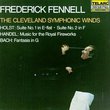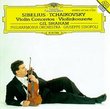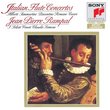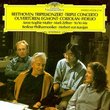| All Artists: Barbara Bonney, Kurt Streit, Ludwig van Beethoven, Sir Simon Rattle, Vienna Philharmonic Orchestra Title: Beethoven: Complete Symphonies; Sir Simon Rattle/Vienna Philharmonic Members Wishing: 0 Total Copies: 0 Label: EMI Classics Original Release Date: 1/1/2003 Re-Release Date: 4/8/2003 Album Type: Box set, Live Genre: Classical Style: Symphonies Number of Discs: 5 SwapaCD Credits: 5 UPC: 724355744524 |
Search - Barbara Bonney, Kurt Streit, Ludwig van Beethoven :: Beethoven: Complete Symphonies; Sir Simon Rattle/Vienna Philharmonic
 | Barbara Bonney, Kurt Streit, Ludwig van Beethoven Beethoven: Complete Symphonies; Sir Simon Rattle/Vienna Philharmonic Genre: Classical
|
CD DetailsSimilarly Requested CDs |
CD ReviewsMixed bag - some good readings, but weak overall jgarcia112 | NJ United States | 04/15/2003 (2 out of 5 stars) "Rattle's new Beethoven Symphony cycle is a pretty solid disappointment given the high expectations that I, and many others, had for it. My first impressions were lukewarm, but I was hopeful that the cycle would grow on me. Unfortunately, the opposite occured, and after several weeks aquaintance, this cycle has dropped even lower in my estimation. As has been noted by many, Rattle makes the VPO play in a period style with little vibrato, quick tempos, and generally spare (if rhythmically detailed) textures. This approach has been successfully applied before (Zinman, Mackerras, Harnoncourt), but Rattle doesn't pull it off as well as the aforementioned others in my opinion. To much of the time the orchestra simply sounds unpleasantly thin, edgy and off balance, as opposed to lean, lithe and transparent. The thin, edgy sound of the orchestra is exacerbated by the sub-par engineering which is seriously lacking in midbass weight, in addition to having a rather narrow soundstage. Add to that too much emphasis on the high mid-range and the basic sonic picture is unattractive. Having pointed out these initial basic flaws, I would say that Rattle scores highest marks in the 3rd and 9th symphonies which are very well done, especially the 9th, which is one of the best modern recordings I've heard despite some idiosyncracies in the finale. The rest of the performances are quite mixed.The first two symphonies are given quick, period style performances as has become almost the norm these days. Rattle's versions are not bad, but not appreciably better than many others I've heard, and not as good as Abbado's.As I mentioned, the 3rd is quite good - particularly in the first movement which is quite exciting, and in the harrowing second movement. The finale is a bit of a let down, but the reading overall is very strong.The 4th and 5th are also two of the better readings in the cycle, however I would not consider them competitive with the best available. But they were enjoyable. I would have liked even more fire in the first movement of the 5th, though.The 6th is terrible, IMO - one of the worst I have ever heard, and the major "turkey" of this cycle. Everything sounds calculated, mannered and unnatural, and in many places Rattle's reading really hangs fire. Tempos are on the broad side, which I don't mind (Celibidache's reading is one of my favorites), but in this case the whole reading is curiously lifeless. The 6th is my favorite of the LvB symphonies, but this was a major chore to sit through. A total bust.The 7th and 8th are not so great either. I dislike Rattle's fussy way with the first movement theme of the 8th, and the finale is a little slower than I would have liked. The 7th just doesn't sound convincing to me, and I found the vibrato-less period-style incarnation of the VPO more annoying here than elsewhere.The 9th really is superb, however, and I hope that it is released on its own, because it really is a worthy performance for any collector. The whole period-style thing seems to have been scrapped for this work, and the VPO really sounds more in their element. The first movement is close to ideal - perfectly paced, dramatic, and full of fire. The second is quite good, and the slow third movement is very beautiful. In the finale things go astray a bit, particularly in the coda, which is just bizzarre and totally unconvincing (what's with the piccolo?). But all things considered, this is worth a listen if you ever get a chance.I would not recommend this cycle to someone looking for their first complete cycle. Blomstedt/Dresden on Brilliant Classics is much better overall, and can be had for under $... Otherwise get individual performances. This cycle is strictly for the curious, and those willing to take a chance - maybe you will like it better than I did." Sir Simon's Beethoven Giacomo Holdini | Minneapolis, MN | 04/10/2003 (5 out of 5 stars) "When being courted as Artistic Director of the Birmingham Symphony Orchestra a decade or so ago, Sir Simon Rattle responded by saying something to the effect of, "OK, but don't expect me to play any Beethoven symphonies." At the time, Sir Simon apparently had no desire to travel down the well-worn, highly commercialized path of Beethoven symphonic interpretation. In defense of his position, it must be said that every major (and minor) conductor who has ever stepped upon the rostrum has tried his hand at the Great Nine; moreover, the recording catalogues are littered with various recorded interpretations. What could a twenty-first century English conductor possibly have to add to the wealth of interpretations already before the public?It comes as a bit of a surprise, then, that one of Rattle's first major recording enterprises as newly minted conductor of the Berlin Philharmonic is a complete set of the Nine performed with that other great European orchestra, the Vienna Philharmonic - a move made all the more interesting when one considers that Rattle's immediate predecessor, Claudio Abbado, recorded a complete set with the Berliners themselves a scant two years earlier. However, after hearing this set, I believe that Rattle's trepidation at (or disdain of) recording the Nine was ill founded, to say the least. Although similarities can be found between Rattle's and other recent sets (e.g., Abbado with Berlin, Harnoncourt with the COE), as well as legendary older ones (Toscanini with NBC or Karajan with Berlin in '62), Rattle's set stands on its own merits. And based on those merits, I feel it is among the most exciting and compelling sets of the Beethoven symphonies that I have yet heard.Rattle's success lies in a fundamental formula that combines urgent tempi, pointed rhythms, and dramatic dynamics with an insightful, original interpretive flair, all underscored by playing and recording quality of the highest caliber. (Unlike the rounded, at times almost dull sound on Abbado's Berlin set, this set's sound has plenty of bite and point, just what is needed for Beethoven.) Like Zinman and Harnoncourt before him, Rattle uses a "period" approach on modern instruments. The Vienna forces are reduced, and the strings often use a playing technique virtually devoid of vibrato, making them sound more period than modern. Winds and brass stand out in marked contrast. Indeed, I have not before heard interpretations of Beethoven symphonies where the brass is so prominent. However, always his own man, Rattle refuses to be bound by period convention. While seldom wayward, the interpretations bring out personal, dramatic nuances at every turn. Veteran listeners of Beethoven will find themselves surprised at how many new things Rattle brings out of the scores. (Some credit, no doubt, must go to the Urtext editions.) Listen, for instance, to the tragic depths plumbed in the funeral march of the Eroica, or the jubilation of the finale of the Fifth. Of note, too, is his account of the Eighth, in which the work is made to sound every bit as persuasive as the Seventh. (Beethoven always preferred the Eighth to the Seventh, and, hearing this Viennese version, one can easily understand why.) Rarely has depth of expression gone so well with textual fidelity.Lest I sound like PR rep for EMI, I should make note of some reservations I have. At times, the orchestral sound can be a little too spare. While I have always felt that Karajan's ravishing approach to Beethoven's sound world was overrated, feeling that the beauty of it somewhat diminished the dramatic impact of Beethoven's darker side, I nevertheless could have done with a little more vibrato on the strings of Rattle's set, and a bit more fullness in general. Rattle's Pastoral, for instance, lacks something of the lush ripeness that Walter brought to it. Conversely, while the "period" approach to tempi is abundantly evident throughout the first eight, the tables are somewhat turned in the Ninth. The first movement is surprisingly broad. Although it stops short of being sluggish, I nevertheless would have prefered a faster clip in this music. In the finale, Rattle's insights that proved eye-opening elsewhere, here border on being perverse. For instance, the coda rushes in at breakneck speed, but then leaves at a clop rather than a gallop, just the opposite of what we normally would expect. Prior to that, though, the great choral outburst leaves one in awe: this may be an unusual interpretation of the Ninth, but an impressive one nonetheless.While no complete set can equal one that you yourself could assemble from all your favorite individual interpretations of the symphonies, Rattle's set is certainly worthy of issue in an already crowded field. For newcomers to Beethoven who are interested in hearing something in the way of a definitive interpretive vision of the symphonies, if such a thing is even possible, his set is on a short list of ones I would recommend. For those jaded people who have heard it all, or think they have, Rattle's set may just get the juices flowing again." Fine Beethoven From Rattle, But Better VPO Sound John Kwok | New York, NY USA | 07/22/2003 (4 out of 5 stars) "It's a pity that Simon Rattle's Beethoven symphony cycle is the last in a series of recent recordings using Jonathan Del Mar's newly revised Barenheiter edition of Beethoven's symphonic scores. Otherwise, it might have earned recognition as the best recent Beethoven symphony cycle recording. Still it is by far the best Beethoven symphony cycle recorded by the Vienna Philharmonic Orchestra. But should it be regarded as first choice for those interested in a Beethoven symphony cycle, especially one using the new Jonathan Del Mar-edited edition?Simon Rattle demonstrates in these recordings that he is a fine interpreter of Beethoven's scores, which he indicated previously in his Beethoven piano concerti cycle with pianist Alfred Brendel, recorded too with the Vienna Philharmonic. However, he doesn't quite match the lyricism or textural richness attained by Harnoncourt, Zinman or Abbado. Instead, for most of the symphonies, these are simply well played, clinical accounts of the Jonathan Del Mar scores. The most notable exceptions are those of the Third Symphony (Rattle's interpretation, especially of the first and second movements, is among the most exciting I've heard, easily comparable in quality to Abbado's most recent account, Giulini's with the Los Angeles Philharmonic, or any of Karajan's.) and the 9th Symphony. The 5th symphony is a fascinating interpretation too, and one of the few which adhere closely to the brisk interpretations favored by Zinman and Abbado. Unfortunately, the 6th symphony lacks the majestic lyricism I've heard in Bruno Walter's classic account with the Columbia Symphony Orchestra and the rich textures I've heard in Harnoncourt's and Abbado's (When I met Harnoncourt earlier this year I had remarked to him that I was not impressed with his COE recording of the 6th symphony, but it's actually much better than I had thought, since it is a rich, texturally glowing account which requires repeated listenings.) versions. And the worst account in this cycle has to be Rattle's interpretation of the 7th symphony; much to my surprise he isn't as inventive as Abbado in using swift changes in tempi or as successful as either Carlos Kleiber or Abbado in emphasizing the score's intricate architecture.So should you buy Rattle's account of the Beethoven symphony cycle? My answer is yes if you treasure the rich sound produced by the Vienna Philharmonic in its concert hall, the Musikverein. The sound quality is among the best I've heard, equal to Abbado's. But if you prefer more exciting, dynamic accounts of Beethoven's symphonies, then I would recommend instead, Harnoncourt's and Abbado's, with Zinman's a first choice for those on a budget."
|

 Track Listings (8) - Disc #1
Track Listings (8) - Disc #1








